The ouster of Vietnamese President Vo Van Thang over anti-corruption reflects the anti-corruption storm in Vietnamese politics
On March 21, the Vietnamese National Assembly held an extraordinary meeting and voted to pass a resolution to remove Vo Van Thang from his post as President of the State, and announced that Vice President Vo Thi Yong Chun would serve as Acting President of the State.
Just the day before, the Central Committee of the Communist Party of Vietnam held a meeting and approved Vo Van Thang's resignation.
The President of the State is the head of state of Vietnam and represents Vietnam's national image internally and externally.
** The President of the State is also one of the so-called "four carriages" in Vietnamese politics. The other "three carriages" are the General Secretary of the Central Committee of the Communist Party of Vietnam, the Prime Minister of the Government, and the Chairman of the National Assembly. These four people are the core leadership of Vietnam and control the highest power in Vietnam. **
Political shock:The resignation of the president of the country has attracted widespread attention.
Vo Van Thang, born in 1970, is the youngest leader of the Political Bureau of the Communist Party of Vietnam.
He was once regarded as the successor to General Secretary of the Central Committee of the Communist Party of Vietnam Nguyen Phu Trong and a dazzling star in Vietnamese politics.
A year ago, in March 2023, he succeeded Nguyen Xuan Phu, who resigned, and became the President of Vietnam. Vo Van Thang is young and promising. He has been active since serving as president of the country for a year and is relatively "active" according to Vietnamese people.
 武文赏
武文赏
Many people shouted "It's a pity" for such a capable political star to suddenly step down.
The VNA news release said with regret,"Comrade Vo Van Thang is the main leader of the party and the country... He grew up from the grassroots level and held many important leadership positions in the party and the country."
However, according to reports from the Central Inspection Commission of the Communist Party of Vietnam and relevant departments, Vo Van Thang violated the "Ban on Party Member Behavior" and the "Regulations on the Model Responsibility of Party Member Leading Cadres."
"Comrade Wu Wenshang's violations and shortcomings... damaged the prestige of the party, the country and his individual. The comrade deeply realized his responsibility to the party, the country, and the people,"so he submitted his resignation and applied for retirement.
The general meaning is very clear: Vo Van Thang violated the regulations of the Communist Party of Vietnam and caused bad influence, so he voluntarily resigned.
According to some foreign media reports, when Wu Wenshang used to serve as secretary of the provincial party committee, there were illegal problems in local enterprise construction projects, and Wu Wenshang needed to assume his responsibilities as the "top leader" in accordance with relevant regulations.
Vo Van Thang's resignation is not an isolated incident, but the tip of the iceberg of the anti-corruption storm in Vietnamese politics. In recent years, there have been frequent personnel changes and reshuffles in top political leaders in Vietnam, and officials involved in corruption issues have been dismissed one after another.
Just a year ago, the stepping down of Vo Van Thang's predecessor and then-President of Vietnam Nguyen Xuan Phu also shocked the world.
The reason for Nguyen Xuan Phu's resignation was that two "major cases" occurred in Vietnam at that time, two deputy prime ministers resigned and three government ministers were sentenced. The case mainly occurred during Nguyen Xuan Phu's earlier tenure as prime minister.
The Vietnam News Agency reported at the time that Nguyen Xuan Phu had "made a lot of efforts and achieved important results" as prime minister, but he still had to "bear political responsibility" for a series of cases involving COVID-19 corruption.
The two Vietnamese presidents resigned and stepped down one after another during their tenure, triggering "carnival" hype in the Western media.
With the mentality of watching a show and watching a joke, they said that "the presidency of Vietnam burns his butt" and wanted to "wish the new President of Vietnam good luck." They also said that Vietnam's internal affairs would be in chaos...
Vietnam anti-corruption:Comprehensively reproduce China's useful experience.
The reason why Vietnam's anti-corruption campaign has attracted much attention is not only because of the frequent changes in its top level, but also because the Vietnam Communist Party of Vietnam has shown firm determination and courage to fight corruption.
**越共领导人阮富仲强调,“反腐无禁区、无例外”,He also expressed the need to strengthen party building and achieve the goal of "not daring to corrupt, not being able to corrupt, and not wanting to corrupt." **
Both the concept and the formulation fully demonstrate that Vietnam, which is "comrades and brothers", has replicated China's experience in building a clean and honest party style. (See this number ["Comrades Add Brothers", Makes Some People Sorrow Again "]()
 越 共中央总书记阮富仲
越 共中央总书记阮富仲
At the 13th National Congress of the Communist Party of Vietnam in 2021, South Vietnam proposed the goal of "Two Centenary Goals" to become a middle-income developing country in 2030, the 100th anniversary of the founding of the Communist Party of South Vietnam; become a high-income developed country in 2045, the 100th anniversary of the founding of the People's Republic of Vietnam.
In order to realize this ambition, the Viet Nam has paid more attention to party building and rectification in recent years, introduced a series of new regulations to strengthen cadre management, established the Central Anti-Corruption and Anti-Negative Commission, and established corresponding provincial institutions.
Moreover, this series of new regulations is no longer the same as in the past, but has been implemented.
Since the 13th National Congress of the Communist Party of Vietnam, nearly 100 cadres in central government administration have been punished, and some have even been held criminally accountable. Among them, there were 18 members of the Political Bureau, and 4 of them (including Wu Wenshang) were dismissed.
